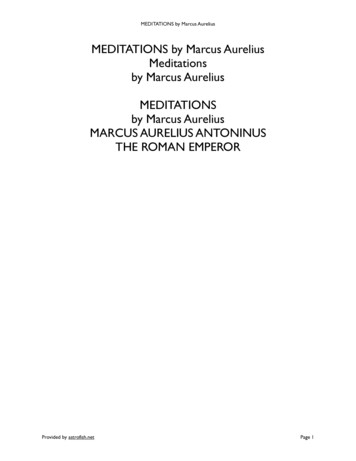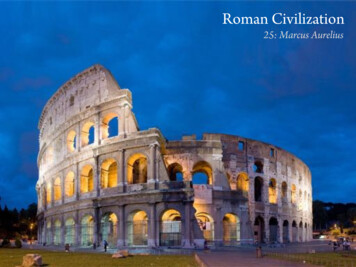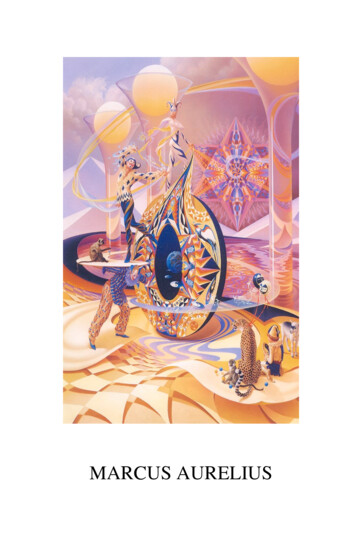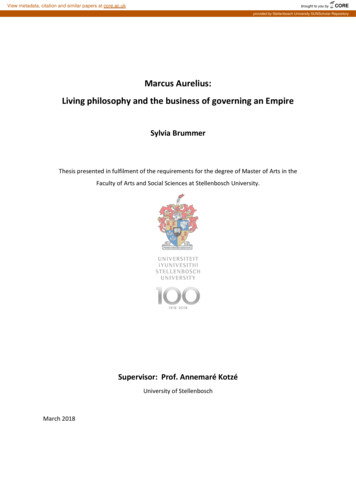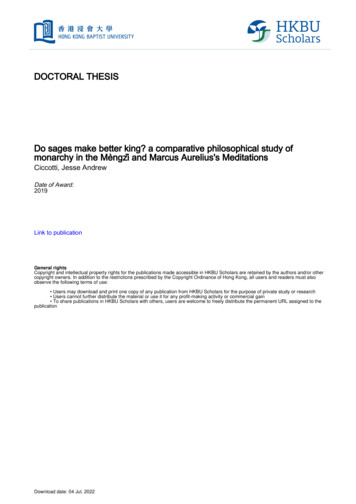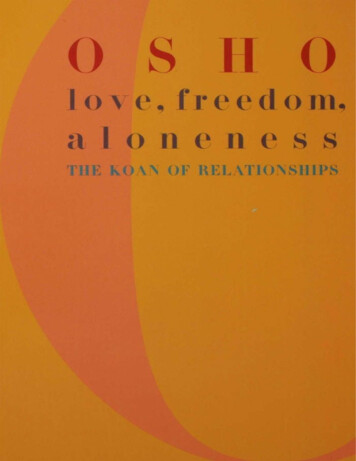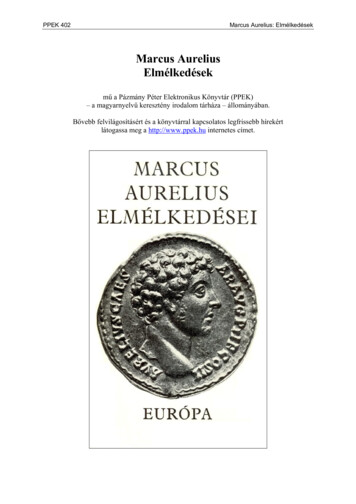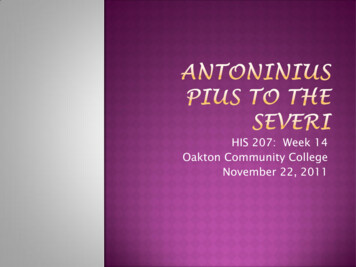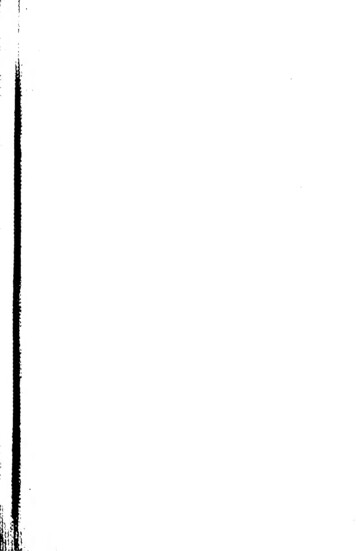
Transcription
B580.C69 1887Meditations of Marcus AurellusL/T153 DD53155Er'ersityofConnecticutInv flf iMriJ6«U18ONO
be CamelotSeries.Edited bv Ei sEsx Rhys.MARCUS AURELIUS.
-' THEMEDITATIONSOFMARCUS AURELIUSTr ansl ded from the Gj-eekByJEREMY COLLIERRevised, with an Introductionanai\otesBy ALICE ZIMMERN.LONDONWALTER SCOTT, 24 WARWICKPATERNOSTER ROW1887LA E
Bc6 /mi
cCONTENTS,PAGEINTRODUCTION .8333 BOOKVII.103 BOOKVIII.121BOOKIX.141BOOKX.159.179XII.195-3BOOK XLBOOKNotes209
;MARCUS AURELIUS.NTILphilosophers are kings, and the princesworld have the spirit and powerofthisofphilosophy, and political greatness andwisdom meetbelieve—andin one, cities will never cease—from ill no, nor the human race, as Ithen only will our state have a possibilityand see the light of day." "The truth is, that thewhich the rulers are most reluctant to govern isandmost quietly governed, and the state in whichbestthey are most willing is the worst."Thus writes Plato in his Republic, laying down theconditions, which even to him appear impossible, underwhich a state may be wisely governed. The ruler must bea philosopher as well as a king ; and he must governunwillingly, because he loves philosophy better thanOnce in the history of the world these condominion.in Marcus Aurelius we find theditions were fulfilledoflife,state in:philosopher king, the rulerwhopreferred the solitude ofthe student to th splendour of the palace, the soldierwholoved the arts of peace better than the glory of war.It iswith no small interest that we turn to the records ofhistory to see what was the outward life led by this kingbut even more willingly do we open the precious record of
—MARCUS AURELIUS.viiihisownthoughts, which reveal to us the innerlifeof thephilosopher.Marcus Aurelius Antoninus was the adopted, son of theEmperor Antoninus Pius, who died in 161 a.d. He hadbeen brought up with the utmost care by his adoptiveand received the best instruction in poetry andfather,rhetoric,Butat that time the staples ofa liberal education.was philosophy, and when onlyeleven years old he assumed the philosophers' simple dress,adopted their mode of life and finding that his inclinationwas chiefly towards Stoicism, he attached himself to thishis favourite study;the strictest of the philosophic schools.jOQua tic mmonly called pleasure, andnought but virtue, was indeed a strange trainingbodily comfort,care forthat badeAallthatisone destined for the imperial purple, andithardlyappeared to be a fitting preparation for the cares of whatwas then the one great Empire of the world. True, the Stoicslovedtocallthemselves citizens of the world,and toinculcate that cosmopolitanism that is broader and noblerthan mere patriotism ; but while they maintained in theorythat the wisetheremanshould take part inwas always somethingpolitics, in practicein the existing state of thingswhich made his doing so unadvisable.But MarcusAurelius could not choose his own lot.Destined for thethrone already by the Emperor Hadrian, associated in theempire even in his adoptive father's lifetime, he could butlot, andin striving to practise the nobleaccept hisprinciples hehadlearnt,pay tohis Stoic teachers the truesttribute. is was atroubled reign.The Homan Empire, whichhad been graduallyboundaries, had been consolidated,in the vigorous days of the Republicbut surely extendingits
MARCUS AURELIUS.ixand newly administered by Julius Cjesar and Augustus.On the death of the latter it extended from the Atlantic onthe west to the Armenian mountains and Arabian desertson theOneast.the south the African deserts had alonestopped the conquering arms, while on the north a line ofnatural boundaries was tracedRhine, Danube, Black Sea, andby theill-success thatgenerals on theby the English Channel,MountWarnedCaucasus.attended the later campaigns of hisLower Rhine, Augustus had cautionedhissuccessors to aim at preserving rather than increasing theirThus it came about, that between the yearswhen Marcus Aurelius succeeded to thethrone, only two fresh conquests had been madeBritain,a source of more trouble than profit to the empire, andDacia, conquered by Trajan in 106 A.D.Natural boundaries and Roman legions kept peace anddominions.14 and cleofRomanBut there were two weak points on theseOn the north the hardy German tribes on theDanube and Upper Rhine, themselves hard pressed byborders.Slavonian intruders from Russia, threatened to invade theRoman dominionon the east the " insolent Parthian,"long the terror of the Roman arms was a constant sourceof trouble and danger. .Xlxft pRane-lnvi g jIarcus Aureliuswas obliged to cope with both these enemies. The arms,or rather the army, of the insolent and profligate LuciusYerus for a time subdued the Parthians, but no lastingHe himself conpeace was destined Marcus Aurelius.ducted the campaigns on the Danube, and again and againbeat back the northern enemy in wars, of which the chiefinteresttoMeditation sus—;now" Thisconsistsinthescant notes in the" this at Carmun-among the Quadi,"tum," showing how these precious records of a pure and
MARCUS A URELIUS.Xserene soul were composed amid the storms of battle andthe elation of victory.Theforeign wars.Italy,thoughitNor werehis troubles confined toplague, imported from the East, ravageddid the state good service in carrying offLucius Yerus, Marcus's adoptive brother, whom, in obedience to the wishes of Antoninus, he had associated withempire.There were famines too in thewhich the Emperor tried to cope by schemes ofcarefully-organised charity.And, lastly, Avidius Cassius,one of his most trusted and ablest generals, revolted inSyria, and tried to obtain for himself the empire, deemingit an easy matter to overcome a master who was so full ofgenerosity and compassion that he could only inspire contempt in the mind of the unphilosophic soldier.Therevolt was soon put down, but the leader was killed by onehimselfin theland, withof hisownofficers.regretthathe should have been thus deprived ofThe Emperor expressed onlyluxury of forgiveness, and he carefully destroyedallhisthedocu-ments that could implicate any others in the revolt.Thus in all the trials of his life his philosophy inspirednoble action, and he might worthily be added to the shortlist of those whom the Stoics acknowledged as really goodand great.Amid these records of gentleness and forbearance itseems strange to read that Marcus Aurelius permitted acruelpersecution of the Christians.Amongthe victimsthis reign were Justin Martyr and Polycarp, andnumbers suffered in a general persecution of the churchesIt must not, however, be forat Lyons and Vienne.gotten that the persecution was political rather thanreligious.Of the true teaching of Christianity MarcusAurelius knew little and cared less; but its followers, inrefusing to acknowledge a religion which included theof
MAR C US A URELIUS.Emperors amongorder of things,xibecame rebels against the existingand therein culpable. Of the old sincereits deities,Romebut little could survive in astate where the vote of the Senate had the power to add anew divinity to the already bewildering list. So much thebelief in thegods ofmore important were the outward forms, now that the actualwas gone, and the bond between Church and Stategrew even closer, now that the Church could no longerstand alone.Of the various systems of philosophy at thattime fashionable at Rome, all but the Epicurean couldreadily embody the creed of the old religion, and bytreating the names of gods and heroes as mere symbols,they contrived to combine outward conformity with innerbeliefenlightenment.Notso the Christians.In their eyes theAsilent protestwhole system of idolatry was accursed.was insufficient. It was not enough to refrain from sacrificethemselves;in publicand inprivate, in seasonseason, they exhorted others to do the like;and outofnot contentwith leaving the statues of the gods unhonoured, they wouldthrow them from their pedestals, or insult them in thepresence of the faithful.What wonderthat theRomanslooked on them with suspicion and hatred, and added totheir real ofiences the pretended ones of eatinghumanfleshand indulging in all manner of immorality. In our ownmore enlightened day we know what strange reports gatherround any sect or school that happens to be unfashionableor unpopular.Whatwonder, then, that the secret meetings of the Christians should have given rise to strangerumours, and that the persecutions " were the expressionofa feeling with which a modern statesetAddofmen who wereto thisthatat oncemight regard aMormons andNihilists.""' the Christians often actually provoked* F. Myer's Classical Essays.
MARC US A URELIUS.xiiwepersecution, andbutregret,the law to takeexampleMarcusthatto wonder, thoughceaseAurelius, inits course,we cannotsimplyallowingshould have failed to give anof that perfect toleration to which ChristianityLet us be content to call hira,itself has never yet attained.with Earrar, "the noblest of Pagan Emperors," and sorrowfully acknowledge that we must seek in vain for a Christianmonarch to place beside him. Wars and troubles attendedMarcus Aurelius to the very end of his days. In 177 a.d.A presentiment seemedfresh wars called him to the north.to tell his friends at Kome that they should not see himagain, and they begged him to address them his farewelladmonitions.There is nothing more striking in the wholethan this picture of the great generaldiscoursing for three days before his departure for the warson the deep questions of philosophy. This was indeed theof Aurelius' careertime he was seen at Kome. Worn out by anxiety andfatigue, after once more winning victory for the Romanarms, he died, in Pannonia, on March 17th, 180 A.D.,lastmourned with a note of such true sorrow as never before oragain was raised at the death of an Emperor.It is time to inquire into the nature of that philosophywhich was capable of exercising an influence so distinctlypracticalbyits;when weyet,founders,itsconsideritsteaching as laidethics afford little sugsrestion of such fruits asRomanto bear in thedowndistinct materialism and impracticableitwas destinedworld.was founded by Zeno at Athens abouttime Greek philosophy, which, under290Socrates, Plato, and Aristotle, had lived through a shortperiod of idealism, was returning to its naturally materialistic groove, and the founders of new systems looked backto the pre-Socratic physicists for some theory of theTheStoic schoolB.C.Atthis
MARC US A URELIUS.xiiiuniverse on which they might base their own.speculation had ceased tocharmwasit;Metaphysicalpractical ethics, aand conduct, that philosophy now desired toand though these later schools based ethics onnatural science, they were content to go back to therule of lifesupply;investigatorsoldofforofdevotingto scientificresearch.a system,own accountinsteadthemselves on theirThe two most important schools atStoic and Epicureanand while the;atomicDemocritusthisepoch were thelatter sought in theanexplanation of the"theperpetual flux," theuniverse, the former reverted totheoryofeternal, ever-changing fire of Heraclitus.Before there was a heaven or earth there was a primitive fiery ether.This changes into all the other elements,and yet initsnature ever retains the fiery substratum.First this fiery ether transforms itself into aOut ofwe know themthen into a wateryfluid.massof vapour,this are developed thefour elements aswater, and solid earth,and atmospheric air, and lastly consuming, destructive fire,which is distinct from the everlasting ether. Fire and airare active elements ; water and earth, passive. The creationbegins to assume its present form with earth ; dry earth, by:reason ofitsweight, takesuniverse, arounditup aposition at the centre of thegather the waters, above bothistheand ether complete the whole,ever circling round the other elements which are at rest.The stars are fiery masses firmly embedded in ether, andnourished by the exhalations of terrestrial vapours.Butthey are also living beings, since they are formed out ofliving, animating fire, and they may thus be regarded as" The sun and the celestialinferior or visible gods. deities, too, have their business assigned," says Marcusexpanse ofAurelius.air,whilefire
MARCUS AURELIUS,xivThe worldis faultless,say the Stoics, and must thereforehave been produced by an intelligenthighest reasonisimmanentinHence theand must beartificer.the world,For has it notcreated man, who is self-conscious and personal, and can thecreated be greater than the creator ? And yet, paradoxicalas it may seem, the Stoic god is not a person, but is theregarded as self-conscious and personal.fiery ether thatof allmatterpervadesis itsholds togetherallall things.soul;isthe soul of the universe, whichthings in one fixed law,In one aspect the Deityanother heThis fiery substratumisbut afieryisGodhimself.air-current;inZeus, the intelligent, almost personal lord ofBoth these aspects may be found in Marcusbut in him the simpler ethical teaching, the gentlethe universe.Aurelius;predominate over subtlespeculation on the origin of things, and be speaks of God inlanguage that suggests vividly to us the omnipotent,omniscient. Deity of Monotheism.The Stoics traced back all things to formless matter andMatter was in its naturethe informing, animating ether.eternal, since the underlying fire was imperishable ; but allthings were being gradually consumed, and at the end of aexhortationtoa virtuousfixed period therealllife,would be a general conflagration, whenthings should be reabsorbed into the Deity.more they would be developedafresh,Then onceand another cyclebegin.* The world's great age begins anew,The golden days return,The earth doth like a snake renewHer winter weeds outworn,"sings Shelley, but the Stoics expectedor " fairer Tempes."old;in thenewcycleno " brighter Hellas,"The new things should be butas thethere should be another Socrates,
MARCUS AURELIUS.xvmarry another Xanthippe, and meet with thesame rough treatmeLt at her hands, and finally to beaccused by Anytus and Meletus, and once more utter hisglorious defence, and drain the cup of hemlock among hisde i/iufcu;tosorrowing disciples.Some such schemebythe Stoics, but the laterallimportance tolittlewas certainly acceptedteachers, at any rate, attachedof the universeit,except in as far asitdemonstratedman's intimate connection with the Deity and his fellowmen.They believed that the soul was material, andextended in space.It is the fiery current that is difiusedthrough the body, and holds it together. They regarded itas the guiding or dominant principle, the indestructibledivinesparkItisthe reasoning element, whichthis,between God, the universalreason, and man, to whose lot has fallen a minute shareof it \ while the brotherhood of Man is maintained invirtue of a kinship, not of flesh and blood, but of mindand reason. Though we are not just of the same fleshand blood, yet our minds are nearly related." (MarcusAurelius, Med. ii. 1.)JUd—the Stoies believe in a life after deatK? It is notestablishestheeasy to decide.denyit,They didnot, like the Epicureans, fiercelymaintaining that annihilation alone could removethe terrorsmust atrelationshipofdeath.Undoubtedly the individualsoulbe absorbed into the universal soul ; butwhether this happened at once, or not until the next conflagration, was a point on which authorities were notlastIn any case, the soul must return to the Deitywhence it sprang. This relation to the Deity was thefundamental point of Stoic ethics. It follows from thekinship that man's true good must lie in conformity withthe Deity.But God and reason are identical. Therefore agreed.
MARCUS A URELIUS.xvimust be best suiLeJ tw chesuch a life must be inHence this is the highest eood,in accordance with reasonlifeconstitution of thesoul.accordance with virtue.Andand happiness consists in virtue.Thus the Stoics arrive at their mainisadmirable, virtuemanisthesis.Virtue aloneabsolutely self-sufficientneeds no help from circumstances,;the goodneither sicknessnor adversity can harm him ; he is a king, a god amongmen. All so-called good, if it be not moral good, is includedinthe class of" things intermediate," neither good norSuch absolute claims for virtue had never beforebeen made by any school. Aristotle had stipulated forsufficient external advantages to enable a man to devotebad.himself without further care to thevirtue.TheStoicslifeofthought andwould permit of no such compromise.Virtue, and virtue only, was what they demanded.virtuousman mightThebe a slave, a victim to disease, toall he loved, yet he wouldpoverty, might be deprived ofremain solely and absolutely happy. Virtue was one andindivisible.Whoever was not virtuous was vicious therewas no middle course. Here was a point in their doctrinewhich could hardly be made to square with fact. Weknow too well that men are not divided into virtuous andvicious, but all possess some share of good and evil,and that most men desire what is right, and fail, whenthey do, from weakness rather than viciousness.TheStoics, who demanded absolute virtue and disregard ofexternals, had to confess that the wise men were few andthe foolish legion ; nay, when hard pressed to name theirwise men, they would give a remarkable list Hercules,Odysseus, Socrates, the Cynics Antisthenes and Diogenes;and in the later days of the school, Cato the younger, theonly Stoic among the number.;—1
MARCUS AURELIUS.Such axviialone appears to us sufficient condemnationlistHadno further advancebeen made, Stoicism would be of small interest to us now,but happily it was destined, as Capes remarks in his littlehandbook on Stoicism, to be "tempered by concessions tocommon sense." The paradoxes about the wise man hadbeen borrowed from Cynicism, which was regarded by theStoics as " a counsel of perfection."Diogenes in his tub,bidding Alexander stand out of his sunshine, might excitesurprise and wonder ; but a movement that should lead awhole community to abandon civilisation and resort to lifein tubs would be distinctly retrogressive.In later timesChristian hermits have at best saved their own souls, andthe exhortations delivered by St. Simeon Stylites from thetop of his pillar cannot have influenced the gaping multitude as much as a noble life led in their midst.Withoutthe practical element there would have been no life inChristianity, and Stoicism similarly had to descend from itspedestal, and walk among men.First of all, the theory of absolute good and evil had tobe modified. Virtue was still the only real good, and vicethe only real evil ; but besides these they now admitted aclass of " things to be preferred," and another of " things tobe avoided." Among the former might be included health,good repute, and other advantages which had formerly beensummarily disposed of as "indifferent." Again, while theimpossible wise man still remained the ideal of Stoicism, itwas admitted that there might be good meD with lofty aimsof Stoicism in its earlier forms.and blamelesstheir fellows.and thefoollivesInwho shouldyet dwellamong menaswide gap between the sageup, and as a result the Stoicshort, thewas nowsystem was able tofilledfind a place for real, existinghumanbeings.258
xviiiMARCUS AURELIUS.These more practical developments were coincident withThe Romans wereits introduction into the Roman world.Anation of soldiers and lawyers,nothing if not practical.they had borrowed from Greece her culture, and adapteditto their own needs.So too they borrowed theirphilosophy.When " conquered Greece led her barbarousconqueror captive," a few of the nobler minds at Romediscovered that there was something at Athens worthSome would spend a yearcarrying off besides the statues.or two at Athens studying philosophy;others induced thegreatest teachers themselves to bring their doctrinestoRome andin the first century B.C. all the Greek systems;were represented in the capital of the world. Amongthem all Stoicism found most adherents. Its teachings ofsimplicity, resignation, and calm in the midst of disturbance,found willing listeners among the earnest Republicans, whosaw their hopes of liberty gradually fading before theIts doctrine that suicide wasapproaching monarchy.admissible, even admirable, when circumstances made it nolonger possible " to take ar as against a sea of troubles,"mode of escape from the tyranny they couldThusCato sought death at his own hands whennot avert.the Republic perished, and it was Stoic teaching that forbadeBrutus and Cassius, though not Stoics themselves, to survivepointed to athe battle of Philippi.In the early daysof the empire,when corruption andlicense were at their height, the court evinced deep hatredagainst the philosophers, more especially the Stoics.Theoutspoken manner in which they chastised the wickednessthe time may have led to their unpopularity ; in anycase, there were several decrees of banishment against them,ofand among the victimsat one timewas
MARCUS A URELIUS,**That halting slave, who in NicopolisTaught Arrian, when Vespasian's brutal sonCleared Rome of what most shamed him.""Well mightthosewhoxixthenameofEpictetus be countedcheer the soul in evil days, foramongwhere can sweeterresignation or truer piety be found than in such words as— " Dare to look up to God andDeal with me forthe future as thou wilt, I am of the same mind as thou artI am thine I refuse nothing that pleases thee lead mewhere thou wilt clothe me in any dress thou choosest isit thy will that I should hold the office of a magistrate,thesesay,::::that I should be in the condition of a private man, stayhere or be an exile, be poor, be rich%I willmake thydefence to men in behalf of all these conditions." Thesewere not empty words, for they found their illustration inthe life of the speaker.In the lame slave Stoic ethics rose to its noblest heightsit was left to the imperial philosopher, by broadeningand humanising its teaching, to give to the world in hisMeditations " the gospel of those who do not believe in butthe supernatural."—These Meditations were not written as a whole probablythey were never intended for publication ; they are simplythe Emperor's commonplace book, where he entered hisreflections, often quiteandowneternity.Bythisunconnected, on the things of timemeans he seemsto have adopted hisown mind, there tonoteworthy that in Marcuscounsel of withdrawing into hisseek calm and quiet.ItisAurelius the claims of natural affection are never disBook I. is entirely devoted to recording hisregarded.and teachers for theFor all those helpswhichcanbeadvantagestracednone of these, hetoandobligationtohisparents,friends,benefit of good training or example.
XXMARCUS AURELIUS.simply thanks" the gods," without further discussion orinquiry intogivestheirnature.The same lovingdispositionto the Stoic doctrine of the citizenship of thelife Marcus Aurelius truly finds himself akin to allmankind. "Ma iad-ara under one common law and ifso, they must be fellow-citizens, and belong to the samebody politic. From whence it will follow that the whole" Now aworld is but one commonwealth " {Med. iv. 4).social temper is that which man was principally designedworld.; for "commonstrive for theownThis brotherhood of(vii. 55).advantage. wholeswarmis"manwill lead us togood, and reckon nothing else ourThat whichnot for the interest of theisnot for the interest of a single bee" (vi. 54).It will lead us also to pity and forgive our enemies.sinceithas fallen tomy"Andshare to understand the naturalbeauty of a good action and the deformity of an ill onesince I am satisfied the person disobliging is of kin to me,and though we are not just of the same flesh and blood, yetour minds are nearly related, being both extracted from theDeity, I am convinced that no man can do a real injury,man can force me to misbehave myself nor canin my heart to hate or be angry with one of mybecause noI findownit;nature and family.assistance,asthefeet,For we areallmadethe hands, and thethe rows of the upper and underteeth "(ii.formutualeyelids1).;asMarcusAurelius loves to dw ell on the instability and insignificance" The vast continents of Europe and Asiaof al l things.are but corners of the creation;the oceanisbut a drop,and Mount Athos but a grain in respect of the universe,and the present instant of time but a point to the extent ofeternity.These things have all of them little, changeable,and transitory beings " (vi. 36).We shouhL-Accustomourselves to watch the eternal course of destruction, and
MARCUS AURELIUS.that therealiseuniversedeath of one thingisitselfpurpose,it isitthingTheThe universalNow, for thewax.sustainsno harm."the birth of another.nature works the universal matter likeand runxxia horse; soon after you will haveitmelteddowninto the figure of a tree; then a man, then some-And it is but a little while that it is fixed in oneNow a tr'ink feels no more pain by being knockedelse.species.in pieces than"Deathwhenitwasa id generation arefirstAmid"(vii.;forthedoes butfirstthose elements the latter had combined"allthis23).both mysteries of nature, andsomewhrxt resemble each otherdissolvfjput togetherchange the only true goodis(iv.5).philosophy,which teaches us to keep our guiding principles pure anduntainted by bodily impressions."Toss me into whatcliniate or state you please.For all that, I will keep mydivine part content if it but exi t and act in accordancewith its nature " (viii. 45). Nothing external can influenceu?i, unless we pronounce it good or evil.This is in accordStnce withthe Stoic doctrine, thatmaterial impression on the soul;butallmake asensationsit is leftto the reason-ing or guiding principle to decide whether they are true orfalse,good orevil."Holdfaculty, for this alone ishonour your opinionativeable to prevent any opinion frominoriginating in your guiding principle thatiscontrary tonature or the proper constitution of a rational creature(iii."9.)ceasesDo notsuppose you are hurt, and your complaintcease your complaint, and you are not hurt";"(iv. 7),writes the Emperor, using, as he so often does, an obscuredogmato point a practical moral.Suchhepractical teachingrises to higher flights.thenes'scomment onabounds in Marcus Aurelius butHow gladly he quotes Antis-the kingly prerogative.thing to be iL spoken of for good deeds";" Itisa royal(vii. 36).How
MARCUS AURELIUS.xxiiwell he satirises the craving for gratitude, so aptly definedby a French writeras the"Some men, whendeeds.'usury'weexact for our goodthey do you a kindness, at oncedemand the payment of gratitude from you othersmore modest than this. However, they remember;favour, and lookupon you asmuchtheir d.' btor in a manner.know what they havethird sort shall scarcearetheAThesedone.which is satisfied by being fruitful inbunch of grapes without expecting anythanks for it. A fleet horse or greyhound do noi make anoise when they have done well, nor a bee neither whenareitslike a vine,kind, and bears amadeshe hasa little honey.Anddone a kindness never proclaimsmanthus ait,th athasbut does another asnextsoon as he can, just like a vine that bears again theNow weseason.should imitate thosescathingiswhoon their beneficenceas hardly to reflectare so obliging." (v. 6).And how"HowHarkyou,this criticism of the aflfectation of virtuefulsome and hollow does thatmanresolved to deal straightforwardly with you.'what need!look that cries— 'I amLet your actionsI wouldspeak ; your face ought to vouch for your speech.have virtue look out of the eye, no less apparently thanI would havelove does in the sight of the beloved.friend,of all this flourish'?honesty and sincerity so incorporated with the constitutionthatitHerenessshould be discoverable by the senses"is— "Theinjury"(xi.15).another gem that sparkles with especial bright-waybestofrevengeisnot to imitate the(vi. 6).Very nobleprayer —" Thisisthismanfrom some trouble;conception of the true function of.invokes the gods to set him freelet itbe your petition that youi' mind.may never put you upondevout to prevent thesuch a wish.loss ofhis son.AthirdisveryBut I would have
MARCUS A URELIUS.xxiiiyou pray rather against the fear of losing him. Let thisTo quote frombe the rule for your devotions " (ix. 40).the Meditations is a tempting task, but they lie before theWe must howreader, and he can make his own choice.ever briefly inquirehow Marcus Aureliustreats those greatquestions to which each system must find some answer, orelseabandonitsorigin of evilisclaims to be a guide throughThelife.a difficulty that every system has had toand most obvious ars ument asrainstThe Stoics boldlythe existence of an All-wise Providence.The world isfaced the difficulty, and denied the facts.meet.Itistheperfect, they saidgeneral good.first;allthat seems evilisrequired for theOni)ii,s,,point' farcus Aureliusperfectlyisorthodox, but he condemns too curious inquiry. i. " Does—Are thereyour cucumber taste bitter? let it alone.brambles in your way? avoid them then. /'Thus far youBut, then, do not ask, What does the world withare well.such things as this % for a natural philosopher would laughat you.This expostulation is just as wise as it would beto find fault with a carpenter for having sawdust, or a—''tailormarkEpictetus had saidshreds, in his shop."isnot set up for the purpose of missingdoes the nature of evil exist in the universeno absolute evil,So too Marcus Aureliusthereis:harmto the universefio jiarffitlieto anyone ";it is"allAsa;"thatis,subordinated to good.Wickedness generally does noso too in particular subjects it does(viii.55).Attimes he points not touniversal law, which he regards as the providence ofthe universe, but to the existence of gods,all":so neitherit,things for the best.TheBut he neverwho mustdirectasserts this withanybetween gods and atoms,and though Marcus;Aurelius pronounces for the former, he desires to showcertainty.bet
MEDITATIONS OF MARCUSAURELIUS TransldedfromtheGj-eek ByJEREMYCOLLIER Revised,withanIntroductionanai\otes ByALICEZIMMERN. LONDON WALTERSCOTT,24WARWICKLA E PATERNOSTERROW 1887. B c6 / mi. c CONTENTS, INTRODUCTION BOOK I.
